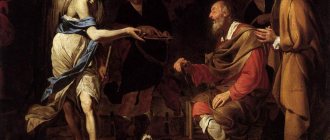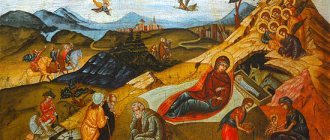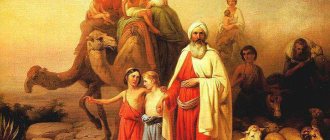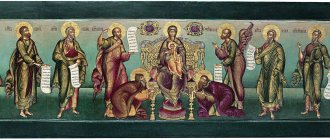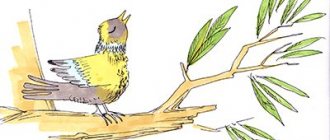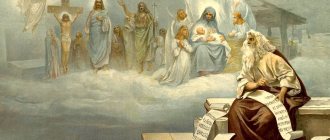Psalm No. 20 (כ)
(1) The leader [of the musicians]. Song of David. (2) May G‑d answer you in the day of trouble, and may the name of the Almighty [G‑d] Jacob strengthen you. (3) May He send you help from the sanctuary and may He support you from Zion. (4) He will remember all your offerings, your burnt offerings will turn into ashes forever. (5) He will give you according to your heart's desire; He will fulfill all your plans. (6) We will rejoice in Your salvation, in the name of our Almighty we will raise our banners. May G-d fulfill all your requests. (7) Now I know that God has saved His anointed. He answers him from the heavens of His saints with the power of His saving right hand. (8) Some rely on [their] chariots, others on horses, but we mention the name of G‑d, our Almighty. (9) They bowed down and fell, but we stood up and rose (10) God, save us! May the Lord answer us on the day when we cry.
1 It will always be accepted (Metzudat David).
Every day it is customary to read a chapter, the serial number of which corresponds to the age of the Lubavitcher Rebbe SHLITA King Moshiach:
Psalm No. 120.
(1) Song of Ascent1. I cried out to G‑d in my trouble, and He answered me. (2) God, deliver my soul from lying lips, from an evil tongue. (3) What will the evil tongue give you and what will add to you? (4) [After all, he is like] the sophisticated arrows of a hero, with burning coals of wood2. (5) Woe to me that I live in a foreign land near Meshech, I dwell among the tents of Kedar3. (6) My soul lived long with those who hated the world. (7) I am peaceful, but as soon as I speak, they [immediately] go to war.
1 Fifteen songs that the Levites read as they ascended the 15 steps of the Temple (Rashi, Radak, Metsudat David). 2 Gorse is a shrubby steppe plant. It burns for a long time, and its coals seem to be extinguished on the outside, although they are hot inside. The evil tongue is likened to them (Rashi, Radak, Metsudat David). 3 Meshech and Kedar are nomadic Arab tribes.
Reading Psalms for today:
Psalms of David
Childhood. Grandmother. Full handfuls of fragrant strawberries and yellow fragrant cherries from that same gnarled tree that dad had long wanted to cut down. The hot, cracked soil of the garden path burns your bare heels. Cool house with thick stone walls. A round table covered with colored oilcloth. There are a handful of small coins on the table, which are interesting to arrange into piles. Shopping list on a crumpled piece of paper. Black horn-rimmed glasses with thick convex lenses, and a small book with embossed patterns on a dark brown leather cover.
The worn, salted pages, torn at the edges, which have seen many grandmother’s pockets, smell of antiquity. The mesmerizing polished gold letters on the cover are eye-catching.
P-sa-l-we... Incomprehensible to a child, mysterious, sublime words mixed with the smell excite the imagination. A very strange feeling in my chest. Breathing slows down, and the focus of sensations moves into an unknown dimension.
There, outside, it’s summer heat under the scorching sun. Ordinary people with their own worries and problems. Everyday life. Barking dogs and clucking chickens. And here, in the twilight of the old house, there is coolness to the heated body, and appeals and pleas pierce the mind and excite the soul of the child. To whom do these laments cry for help and mercy? Who is this Lord? And this strange word Hallelujah...And what does the word Psalms mean? When were they written? And most importantly, by whom? And if you addressed Him, did that mean you knew Him personally? Did you know who? What is He like? And where is He now? How many thousand years is this book? Does grandma know? Hardly... Who should I ask? I want to know, I want to understand, I want to touch the Secret....
“From the depths of my heart I called to you!”
More than 3000 years ago.
David, a sheep shepherd in childhood, later the second King of Israel, the greatest of the Kabbalists, describes in his book the entire connection of man with the common Nature. In it, he expresses exactly how our common, united soul turns to the Higher Power that created it. He speaks on behalf of everyone and directly, through all his people, to the Creator, whom he reveals in the community of the people of Israel, in the unity of the mechanism of a common nature. And all this is about man’s connection with the correction of the world, about Israel’s involvement in this, about the system of the universe agreed upon by all. Everything that is written flows from the deepest depths of the heart of King David. And only he can write it because he knows how to implement it.
“King of Israel” is the greatest depth that has ever been revealed in a person.
The sweetest songs of Israel
This is the name of the Book of Psalms or the book of Tehillim, written by David, consisting of 150 verses. She is very special. There is no book from which hundreds of generations over thousands of years have drawn solace, satisfaction and peace as this Book. It includes all possible states that a person or all people together can experience. Anyone who picked up this Book probably found poems or even individual phrases that he felt close to himself. It's as if they strengthen him, warm him and awaken something in him. There is always a certain reaction of the heart. Any person, at any time and in any situation, in every verse of this book can find himself, receive a hint or an answer. That’s why the Psalms touch everyone’s feelings so much. They help and support, fill with strength. They turn the soul to reverent prayer and glorification of the one ruling power. The human mind bows before the awareness of the greatness of the Creator, humbles itself before his power, and the person himself is imbued with gratitude for his infinite mercy, in the hope of mercy.
A feeling of connection with a Higher Power, with a single system to which we all belong, awakens.
Music of the common soul
Not many people know that most prayers, as well as songs of praise and all parts of praise for the holidays, are based on the texts of the Psalms. The verses in the book of Psalms are meant for praise, hence the name Tehilim, which translated means praise. During the time of the Temple there were Levites. Those who were in the quality of bestowal. The Levites sang Tehillim in the Temple and thereby blessed the entire people, uniting them together into one system. They offered praise to the Creator. Praise, even if there are very difficult evil states inside a person - his enemies who rule over him tear him apart from the inside, and he cannot cope with them. He screams and cries because he wants to correct them, and yet thanks the Creator for the states sent to him.
And thereby a person draws closer to Him.
There is one condition, under which the book of Psalms represents a person’s connection with the Creator. “Love your neighbor as yourself.” Fulfilling a rule long known to humanity means that a person organizes himself in a society where everyone strives to realize love for their neighbor. Under this condition, the Book of King David gives Light to those who read it, and reading, even a small passage, is accompanied by a special intention. You can read it in different ways. It's not enough to just read. It's good when there is a need to feel with your heart. You can choose some passages or whole verses that suit the reader. And then you can repeat them several times during the day and try to comprehend them. Or you can open it on any page and read the line that your finger or glance lands on. It is enough to read one sentence. And then try to comprehend its message. Psalms are a special force, and no one in the world rejects this book. And always, to the one who opens it, the Supreme Light will give the Answer.
By reading the Psalms, we call upon ourselves the Light that returns us to the source.
Grandma couldn't know that
The verses of King David are a special internal program that controls us, connecting us with a common nature, a Higher Power. The light that David revealed will have to be revealed to all of humanity. Together! That is why the Psalms are accepted by everyone in the world. If, while reading, we really want to feel the states that King David went through, then we come into contact with this force that pulls us, attracts us and lifts us to these great higher states.
This force is Mashiach ben David, part of the pulling and developing force called “Mashiach”.
It's no longer a secret
That the Book of Psalms provides us with the opportunity to come into contact with that highest state where we all come together to Love our neighbor. And this is due to the fact that in our days the science of Kabbalah, which King David comprehended perfectly, has been revealed to us. And also...
This is a song of Love, glorifying the unity of Man with the Creator.
Liora Leventhal
Psalm No. 77.
(1) To the leader [of the musicians] for Jeduthun, the song of Asaph. (2) My voice is to the Almighty - I will cry; My voice is to the Almighty - listen to me! (3) In the day of my trouble I will seek the Lord. My wound bleeds at night and does not go away; my soul refuses consolation. (4) I remember the Almighty and thirst; I’m talking - my spirit is exhausted. (5) You hold my eyelids1; I'm shocked and can't speak. (6) I reflect on the days of old, on the years of centuries past. (7) I remember my singing in the night, I talk with my heart, and my spirit seeks an answer: (8) Has the Lord rejected him forever, will He no longer be pleased? (9) Has His mercy ceased forever, His speech ended for generations? (10) Did the Almighty forget to show mercy, did He withhold His mercy in anger? (11) I said: “This is my fear—the change of the right hand of the Most High.”2 (12) I will remember the deeds of God when I remember your wondrous deeds of old. (13) I will meditate on all Your deeds, I will talk about Your creations. (14) Almighty! Holy is Your way. Who is the Almighty [G-d] great as the All-Powerful! (15) You are Omnipotent, you do wonderful things; You have demonstrated Your power among the nations. (16) With your arm you have delivered your people, the sons of Jacob and Joseph3 forever4. (17) The waters saw You, O Lord, the waters saw You, they trembled, and the deeps were also troubled. (18) The clouds poured out water, the heavens made thunder, and your lightning also dispersed. (19) The voice of Your thunder was in the wheel, the lightning illuminated the world, the earth shook and roared. (20) Thy way is in the sea, Thy way is in great waters, but Thy footsteps are unknown. (21) You led your people like sheep by your hand, Moses and Aaron.
1 It’s as if you hold back my eyelids, so that I cannot sleep (Metzudat David). 2 The fact that there was a “change in the right hand of the Most High”, that it stopped crushing the enemy, all this was only so that there was “my fear”, which would lead me to repentance for my sins (Metsudat David). 3 The sons of Jacob are also called “sons of Joseph” because he provided them with food during the famine in Egypt (Metzudat David). 4 “Forever” - complete deliverance, after which they do not return to them into slavery (Metzudat David). 5 When You revealed yourself on the Red Sea (Rashi). 6 Galgal - “wheel”, “circle”, “sphere”. According to one interpretation, thunder struck the wheels of Pharaoh's chariots (Metsudat David). According to another, thunder rolled like a wheel over the Red Sea to stun the Egyptian army (Rashi). According to the third interpretation, we are talking about the atmosphere, the air layer surrounding the earth, in which thunder and lightning were heard (Radak).
Psalm No. 78.
(1) The prudent [admonition] of Asaph. Listen, my people, to my instruction; incline your ear to the words of my mouth. (2) I will open my mouth in a parable, I will speak in riddles from ancient times. (3) What we have heard and know, what our fathers told us, (4) we will not hide from their children - from the generation to come - telling about the glory of God, about His power, about His wondrous works that He did. . (5) He established testimonies in Jacob, He laid down a law in Israel, which He commanded our fathers to tell their children. (6) So that the coming generation, the sons who will be born, will know, so that they in turn will tell their children. (7) So that they place their hope in the Almighty, do not forget the deeds of the Almighty and keep His commandments. (8) So that they are not like their fathers, an unfaithful and rebellious generation, a generation that did not adjust its heart and remained unfaithful to the Almighty in its spirit. (9) The sons of Ephraim1, armed and archers, took flight on the day of the battle. (10) They did not maintain an alliance with the Almighty and refused to follow His Law. (11) They forgot His deeds and the miracles that He showed them. (12) Before the eyes of their fathers He performed miracles in the land of Egypt, in the field of Zoan. (13) He divided the sea and led them through, and made the waters a hill. (14) During the day He led them by a cloud, and all night by the light of fire. (15) He cut the rocks in the desert and gave [them] water as if from a great abyss. (16) From the rock He brought forth streams, and the waters flowed out like a river. (17) But they continued to sin against Him, to contradict the Most High in the wilderness. (18) They tempted the Almighty in their hearts, demanding the food that their soul thirsted for. (19) They spoke against the Almighty, saying: “Can the Almighty set a table in the desert? (20) Behold, He struck the rock, and the waters came out and the rivers flowed out. Will He also be able to provide bread and prepare meat for His people?” (21) So God heard and became angry, fire was kindled in Jacob, anger fell on Israel. (22) Because they did not believe in the Almighty and did not trust that He would send salvation. (23) [After all] He commanded the clouds from above, He opened the doors of heaven. (24) He rained down mana upon them to eat, and gave them the bread of heaven. (25) The man ate the bread of the angels; He sent them food to the full. (26) The east wind moved across the sky, and He led the south in His might. (27) He showered them with meat like dust, like feathered birds with the sand of the sea. (28) He cast them down in the midst of their camp, around their habitations. (29) As they ate and were satisfied, He satisfied their desire. (30) Their desire had not yet passed, food was still in their mouth, (31) when the wrath of the Almighty fell upon them, killing the fat ones among them, and deposing the chosen ones of Israel. (32) And yet they continued to sin, they did not believe in His miracles. (33) And he destroyed their days in vanity, and their years in confusion. (34) If [when] He executed them, they would interrogate Him, they would turn, seeking the Almighty, (35) and would remember that the Almighty is their stronghold, that the Almighty [G-d] Most High is their deliverer! (36) But they persuaded Him with their mouth, and with their tongue they lied before Him. (37) Their hearts were not attuned to Him, and they were not faithful to their union with Him. (38) But He, the merciful, forgives sin and does not destroy; He turns away His anger many times and does not arouse all His wrath. (39) He remembered that they are flesh, a spirit that leaves and does not return. (40) How many times did they rebuke Him in the desert, anger Him in the uninhabited country! (41) And again they tested the Almighty; they sought a sign from the holy [Gd] of Israel. (42) They remembered not His hand, the day when He delivered them from the oppressor. (43) When He performed His signs in Egypt, His wonders in the field of Zoan. (44) When He turned their rivers and their streams into blood, so that they could not drink [the water] from them. (45) He sent upon them a confusion of [wild beasts] that devoured them, and frogs that destroyed them. (46) He gave to the caterpillars their harvest, and their labor to the locusts. (47) He struck down their grapes with hail, and their sycamores with ice stones. (48) He gave their cattle to the hail, their flocks to the flames. (49) He sent upon them the flames of His wrath, indignation, rage and disaster, an embassy of evil angels. (50) He paved the way for His wrath, He did not preserve their souls from death, He gave their animals over to the plague. (51) He executed every firstborn in Egypt, the firstfruits of strength in the tents of Ham3. (52) He led His people like sheep, He led them like a flock through the wilderness. (53) He led them in safety, and they were not afraid, and the sea covered their enemies. (54) He brought them to His holy border, to this mountain, which His right hand had acquired. (55) He drove out the nations from before them, whose land he divided into an inheritance for them, and settled the tribes of Israel in their tents. (56) But they tested and did not obey the Almighty [G-d] Most High, and did not keep His testimonies. (57) They retreated, betrayed, like their fathers, turned back like a faithless bow4. (58) They angered Him with their temples, and aroused His jealousy with their idols. (59) When the Almighty heard, he was inflamed with anger and began to greatly abhor Israel. (60) He cast aside the abode at Shiloh, the tent in which he dwelt among men. (61) He gave His strength into captivity, His splendor into the hands of the enemy. (62) He put His people to the sword, He was angry at His inheritance, (63) His youths were consumed by fire, His maidens did not sing marriage songs, (64) His priests fell by the sword, and His widows did not weep. (65) But the Lord arose as if from sleep, like a giant awakened from wine. (66) He struck His enemies in the rear and gave them over to eternal shame. (67) He rejected the tent of Joseph, He did not choose the tribe of Ephraim. (68) But he chose the tribe of Judah, Mount Zion, which he loved. (69) And he built his sanctuary like the heavens, like the earth; he established it forever. (70) He chose David his servant, took him from the sheepfolds, (71) and brought him from the milking [sheep and goats] to feed Jacob, his people Israel, his inheritance. (72) And he shepherded them in the integrity of his heart, guiding them with wise hands.
1 Although the Pentateuch is silent about the campaign of the sons of Ephraim to the Promised Land, during which they died at the hands of the inhabitants of Gath, a brief mention of this event is contained in the book of Divrei Ayamim I (7:20-21). “The sons of Ephraim, armed, archers” - they were confident in the strength of their weapons - and went to conquer the Promised Land, without waiting for the set time of deliverance (Rashi). 2 Zoan - Tanis, the ancient capital of Egypt. 3 The firstborn are called “the firstfruits of strength”: “Reuven, my firstborn! You are... the firstfruits of my strength” (Breishit 49:3). Mizraim (the founder of Egypt) was one of the sons of Ham (Metzudat David). 4 A cunning archer takes careful aim at an object, then suddenly turns around and shoots at someone else. So King David compares with a “faithful bow” a generation that faithfully served the Almighty throughout the life of one judge, but immediately after his death turned to foreign gods (RASHI, Metsudat David). 5 The Ark with the Tablets of the Covenant, captured by the Philistines, is called “His power,” for at that time the Most High struck the Philistines and their god Dagon with many plagues. They got scared and hastily sent the Ark back (see Shmuel I, chapter 5) (Radak, Metsudat David). 6 The young men died in the war, and their brides remained lonely (Metzudat David, RASHI, Radak). 7 Hophni and Pinchas died in battle with the Philistines. The widow of Pinchas did not mourn her husband, since she died during her labor pains (see Shmuel I, ch. 4) (RASHI).
About treatment with psalms and the book Shimush Tehilim
Since ancient times, there has been a custom of reading psalms (Tehillim). More than once in Israel I had to observe how people, seemingly not at all religious, suddenly took out a volume of Tehillim and began to read it . It is known that King David compiled the book of psalms, and he is also the author of most of the poetic works included in it. In addition to the psalms of David himself, it also included the works of Adam, Malkitzedek, Abraham, Moshe Rabbeinu, Heiman, Jedutun, Asaph and the three sons of Korach [1] .
The psalms were written in a state of the highest spiritual uplift, prophetic ecstasy . They are a prayer expressing the thoughts and feelings of the author who is in a certain life situation. Since we, too, sometimes experience a spiritual mood similar to that captured in the psalms, and find ourselves in similar life situations, the words of the psalms have become a generally accepted form of individual prayer. They are read for a variety of reasons. For the recovery of the sick and for success, in joy and in mourning, glorifying G-d and asking for salvation from trouble. It is believed that psalms are not only prayer, but also an effective remedy, sgula, which helps in a variety of cases , capable of protecting a person and bringing him healing. There is even a book called Shimush Tehilim (Uses of the Psalms) that lists the mystical properties of each psalm and how they can be used in practice. At the same time, not everyone knows that in Judaism there is a prohibition to be treated with the words of the Torah [2] .
We know about the mystical properties of the psalms and the prohibition of “being treated with the words of the Torah” from the Talmud. Tractate Shevuot 15b lists the psalms recited during the ceremony of expanding the sanctified area of the Temple Court and the sanctified area of Jerusalem. Among them is the ninety-first psalm, beginning with the words “He who sits under the cover of the Almighty abides in the shadow of the Almighty,” which, according to Rashi, is pronounced to eliminate the harmful forces that cause harm to people . It is further reported that Rabbi Yehoshea ben Levi, in order to protect himself, read this psalm before going to bed, without violating the prohibition of healing with the words of the Torah. According to the Talmud, this prohibition is violated by a person who recites the words of the Torah over an existing wound. But it is permitted to use the words of the Torah not for treatment, but for protection from impending danger. The prohibition is most strict when a person not only utters words, but also spits on the wound. In this case, he is deprived of his destiny in the future world .
The prohibition of pronouncing the words of the Torah for healing is also mentioned in Tractate Sanhedrin 90a, where it is written that there is no inheritance in the Hereafter for the one who recites the verse over a wound: “None of the diseases that I brought on Egypt will I bring on you, for I The Lord is your healer" [3] . On the other hand, Eruvin 54a says: “He who fears a headache, let him learn Torah,...he who fears a sore throat, let him learn Torah...” Maarsho in his commentary explains that it is forbidden to be treated with the words of the Torah, using them as a spell, but there is no prohibition to study the Torah, hoping for a cure as a result of this study , and there is also no prohibition to use the words of the Torah when a person is not yet sick, but only fears a possible diseases.
Rambam, in the section on the prohibition of idolatry, 11:12 writes: “The one who whispers over a wound and recites a verse from the Torah, or recites it over a child so that he does not panic, as well as the one who places a Torah scroll or tefillin on a child, so that he falls asleep - not only violates the prohibition of being guided by superstitions and casting spells, but is also a heretic who rejects the Torah, because he makes the words of the Torah a means for healing the body, while they are a means for healing the soul , as it is said: “... and they will be life for your soul" [4] . But if a healthy person recites verses from the Torah or psalms in order to avoid misfortunes and damages due to the merit of their recitation, then this is permitted.”
The above can be understood in two ways. Either it is possible to read psalms and verses from the Torah for health only when a person is not sick, in order to protect him from possible illness, or the prohibition applies only to such reading of verses from the Torah and psalms when the reciter perceives them as a conspiracy, but is not prohibited read them as a prayer for health or for the sake of fulfilling the mitzvah of studying the Torah, through which the sick person can recover. It is clear that it is unacceptable for the Rambam to recite the words of the Torah or use objects containing the written words of the Torah as sgulah to cure illness.
Shulchan Aruch, Yoreh Deah, 179, decreed this: “He who whispers over a wound or over a sick person and spits and then recites a verse from the Holy Scripture has no share in the Hereafter. If he doesn't spit, then it's simply prohibited. And if there is a danger to life, then everything is permitted. They do not recite a verse over the injured child and do not place a Torah scroll on him. It can be said to protect a healthy person from harmful forces.”
Subscribe to the VAIKRA platform newsletter and receive the most interesting lessons from the site via E-mail, What's App or Telegram
All subscribers will receive 4 unique books as a gift!
Subscribe!
Sefer HaChinuch, in the 512th commandment prohibiting the speaking of incantations, writes the following: “It is known that psalms are recited, since their words awaken the soul, convince one to rely on the mercy and kindness of the Almighty and teach fear of God. Thanks to this, a person can protect himself from any harm. And this is what the Gemara means when it says that it is forbidden to be treated with the words of the Torah, but this does not apply to use for protection . That is, the Torah does not prohibit pronouncing the words of Holy Scripture with the intention of awakening the soul to goodness, so that this merit would protect a person.”
Pri megadim, Orech Chaim, 239, writes: The words of the Torah do not heal at all. But the Almighty is with the one who teaches the Torah, because He is in our world “in four cubits of halachah,” that is, next to the person studying the Torah. And it is said about Him, “For I am the Lord your healer.” [5].
What should you do? When is it possible and when not to recite Tehillim for health?
According to all opinions, for a patient whose life is in danger , one can read Tehilim and use the words of the Torah for treatment in any way without any restrictions.
Tehillim can also be read for a healthy person who wants to avoid danger or illness.
The problem arises only when the patient’s life is not in danger. In such a situation, it is forbidden to read Tehilim as a sgulah, considering that one or another psalm has healing properties, and it is also forbidden to resort to such sgulot as reading verses from Psalm 119 that begin with the letters that make up the name of the patient. This is what Rav Moshe Sternbuch (Teshuvot veAnagot 121), one of the legislative authorities of our time, decreed. On the other hand, there is no prohibition to pray for the recovery of a sick person, including when the text of the prayer is Tehilim , or to say them while fulfilling the commandment to study the Torah. But at the same time, one should definitely remember that they hope for the recovery of the sick person due to the merit of fulfilling the will of the Almighty, who wants us to study the words of the Torah, and so that in times of trouble we turn to Him with prayers, and not because this or that psalm has some medicinal properties (Tzitz Eliezer, 17:30).
Very often in the books of Tehillim it is written for what practical, most often healing, purpose a particular psalm can be used. The source of such prescriptions is the book Shimush Tehillim, where all the psalms are listed in order and the way to use each of them is given. In many modern editions of Tehillim it is given in full. But you should not think that Shimush Tehillim is talking about in what cases one or another psalm should be read. This is a collection of “recipes” for practical Kabbalah , using the text of the psalms and the influence of the divine names hidden in them. Let me give you an example of the first three “recipes”:
The first psalm is “Happy is man...”. Write it on gazelle skin parchment down to the words “and whatever he does will be successful.” The divine name reflected in this psalm is אלח”ד. How is it derived from this psalm? א from אשרי (happy), ל from לא כן (not like that), ח from יצליח (will be successful), ד from דרך רשעים (the road of evildoers). And write: May it please You אלח”ד that (so-and-so’s, so-and-so’s daughter) does not have a miscarriage. And completely heal her now and forever. Amen, Amen, Amen, Selah, Selah, Selah. And hang this parchment on it.
Second Psalm “Why do the nations worry...” To save yourself from a storm at sea, say it, write it on a clay tablet, throw it into the sea and the storm at sea will subside. And if a person is afraid of diseases of the head, write this psalm up to the verse “you will crush them with a rod of iron” and hang it on it.
Third Psalm: “Lord, how many are my enemies.” When a person fears diseases of the shoulders and head, this psalm is recited over olive oil, salt is added and the oil is smeared.
The earliest, among the manuscripts that have reached us, Shimush Tehilim, was written no earlier than 1000 and was discovered in the Cairo Geniza. However, linguistic analysis has shown that the text of Shimush Tehilim was composed earlier, in the 7th-10th centuries , in the language that was used during this period in the land of Israel and in the surrounding regions. It does not contain admixtures of the Arabic language, which spread in subsequent centuries, and it contains borrowings from the Greek language [6] .
The book Shimush Tehilim, or more precisely Shimush Telim, is mentioned by Rashba (Spanish rabbi of the 13th-14th century) in his collection of responsa Teshuvot, part 1, 413, where he discusses the issue of the legitimacy of choosing a certain hour that is more favorable for the action being performed, for example, for writing cameos. Rashba writes that the Jewish sages consider Shimush Telim to be a proven remedy that requires choosing the right hour. But at the same time, in another responsa, Teshuvot, part 2, 281, he also prohibits writing Torah verses on kameos , which does not allow the “recipes” of Shimush Tehilim to be used in practice.
Shimush Telim is also mentioned by Yitzchak ben Moshe HaLevi Duran (Jewish sage, physician and philosopher of the 14th-15th centuries) in the book Maaseh Ephod, preface, p.10. Isaac Duran clearly writes that the utterance of a prayer containing the text of the psalms has mystical properties. He does not speak of any other magical uses of the psalms.
The authorship of Shimush Tehillim is traditionally attributed to the Hay Gaon, the highest legislative authority of 11th century Babylonia. The earliest mention of this is found in the book of R. Brakhya Barech ben Eliakim Getzel, Zera birekh shlishi, Berachot, 23, written in the early 18th century. This book is referred to by Abraham, the son of the Vilna Gaon, who compiled a detailed list of all the written sources of Judaism known to him (Rav Po'alim), and other later publications. The authorship of Hai Gaon is highly doubtful . The fact is that in his responsa (teshuvot ha-geonim ha-hadashot, 115) the Hay Gaon itself is very skeptical about such “recipes”. He says that he had heard rumors about their successful use, but when checked, all this turned out to be untrue . There were people who spent years of their lives trying unsuccessfully to get the desired result with their help. And only “the naive believes every word” [7] .
______________
[1] Here are the names according to the Babylonian Talmud, Bava Batra, 14b. There are other options in the midrash. [2] By Torah here we mean all the books of the Tanakh. [3] Shemot, 15:26. [4] Mishlei 3:22 [5] Shemot, 15:26 [6] Bill Rebiger, Sefer Shimmush Tehillim, 2010 [7] Mishlei, 14:15
This material is the personal opinion of the author. The editors are not responsible for it.
Reprinting of materials is welcome with a link to vaikra.com
Don't miss the most interesting publications for spiritual growth. Subscribe to us on the social network that you love most: Instagram, Facebook, Telegram.
Meira Shlepakov Help the lesson Born in Moscow. Graduated from the Faculty of Medicine and Biology of the Medical Institute. Since 2000 I have been living in Israel, in Jerusalem. I work at a university in a genetics laboratory. Married, three children.
